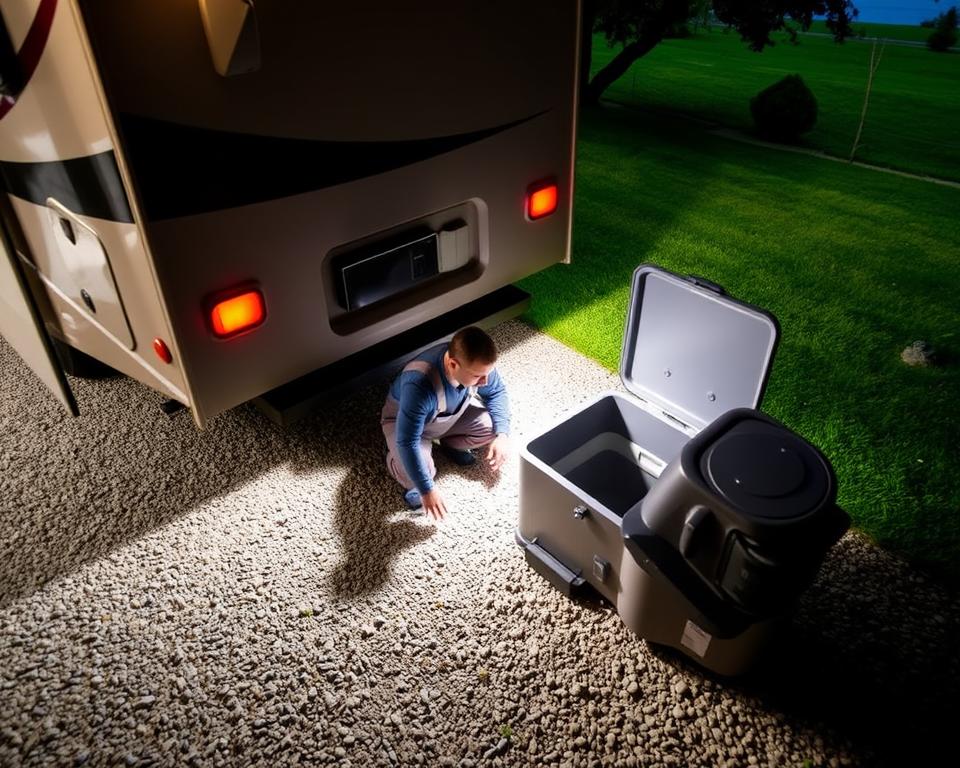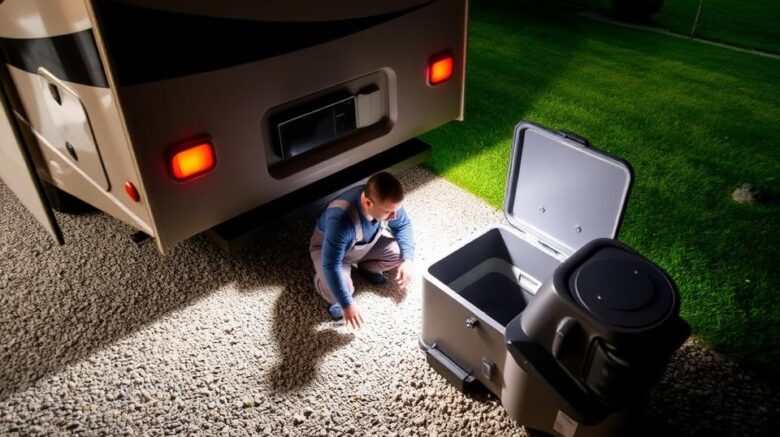RV Wastewater Pump Guide: Key Maintenance Advice
Have you given thought to the functioning of your recreational vehicle sewage network? Knowing the ins and outs of your RV waste pump can avoid mishaps, enhancing your camping trips. It focuses on controlling waste productively and steering clear of noxious odors. With this manual, you’ll discover critical maintenance techniques for RV water pump pressure tank. Each strategy is designed to support your sewer network’s best operation.
Comprehending Your RV Sewer Pump System
The RV sewer pump system is essential for waste handling, making camping more enjoyable. It features two principal tanks: the sewage holding tank for toilet waste and the grey water tank for water from wash basins and shower stalls. Differentiating these tanks is necessary to avoid clogs and keep your RV functioning efficiently.
An RV macerator pump is a widely used solution for refuse disposal. It grinds solid waste into small fragments, simplifying disposal. In contrast, a traditional camper sewage pump is available. It competently moves waste without shredding, for those wanting a simpler option.
Mastering your RV’s waste pump setup is vital to preventing problems and ensuring hassle-free checks. Managing the system correctly can prevent messes, improving your outdoor adventures.
Why Consistent Upkeep Matters
Maintaining your RV sewage disposal pump is essential for a smooth travel experience. Without proper servicing, you may face odors, clogs, or backups. These complications can ruin your road trips.
Scheduled upkeep thwart such snags and sustain your system’s life. By inspecting hoses and seals, you maximize efficiency. A properly cared-for RV sewage pump secures clean waste handling, letting you enjoy uninterrupted travels.
Ongoing care also results in financial savings over time. Disregard can cause major issues, requiring high-cost fixes. Committing to regular maintenance keeps your motorhome in top condition, conserving money long term.
Recommended Frequency for RV Septic Tank Pumping
Determining the proper interval to service your RV Septic tank is crucial for its upkeep. It’s recommended to pump every three to five days during use. For weekend journeys, pumping on return may do the trick.
Frequency depends on multiple considerations. Tank capacity and frequency of use are key. Preferably pump when it reaches two-thirds full. This helps maintain steady waste movement and ward off backups.
Tracking your RV tank fill level is crucial for a stress-free outing. Handle your camper’s effluent to prevent issues while traveling.

Best Practices for Emptying Your Tanks
Safely purging RV tanks is essential for your motorhome’s sanitary condition and operation. Start with the black tank to let the grey tank liquid rinse leftover solids. This strategy ward off clogs and ensures seamless flow.
Select a premium drain hose for disposal. A heavy-duty hose prevents leaks and locks connections. Attach a tank rinser for a intensive cleanse, using water pressure to remove residual sludge, enhancing cleanliness.
Full discharge prevents residue buildup, avoiding foul odors and potential issues. To maintain an optimal sewage system in your motorhome, implement these guidelines:
- Always add a tank treatment after emptying to manage smells and decompose waste.
- Watch capacity to avoid overflow situations.
- Inspect your RV waste pump regularly for clogs and wear.
- Perform a deep tank flush every 4–8 weeks, even during occasional use.
Following these methods enhances your sewage system’s resilience and efficiency, ensuring smooth journeys.
Keeping Smells and Blockages at Bay
For a nice outing, keeping odors at bay is crucial. Ensure tanks have sufficient water to aid in breaking down waste, preventing unpleasant odors. Also, opting for RV-approved tissue helps prevent clogs, maintaining efficiency.
For better sewage management in campers, try bio-agent additives. These effectively break down waste, streamlining care. Check the vent line often to keep air moving freely in the plumbing system.
Careful waste habits is vital to avoiding tank issues. Avoid flushing wipes, feminine products, and paper towels. These non-compostable materials can cause serious blockages. Using these practices helps maintain a more sanitary camping environment.
Maintenance Advice for RV Sewage Pumps
Maintaining your RV’s sewer pump system is vital for smooth journeys. Verify seal condition frequently to stop seepage. Faulty seals can cause surprise messes, harming your RV.
To eradicate odors and maintain cleanliness, sanitizing is crucial. Do thorough sanitation regularly to prevent buildup, ensuring the system operates smoothly. These steps are imperative for maintaining a on-board grinder, promoting longevity and reliable functionality.
Greasing valve components is another important task. It helps ward off seepage and enhance functionality. Checking sensor accuracy is essential for exact data, preventing spillovers and unexpected pump issues. Maintaining vigilance makes your RV adventures cleaner and more enjoyable.
Indicators You Need Expert Pumping
Recognizing waste troubles promptly can save you from bigger headaches. A tell-tale indicator you need a expert emptying is slow draining. When sinks and toilets take longer to clear, it often points to clogs. It suggests your system may be backed up.
Ongoing foul scents are another clear sign of sewage troubles. Unpleasant fumes hanging around despite cleaning suggest trapped waste. It’s crucial to check the transparent elbow fitting when dumping waste. Remaining waste visibility signals it’s time for pro maintenance.
Technicians utilize jet machines to break up hard obstructions efficiently. Neglecting these signs can grow into major problems. Therefore, it’s critical to seek help immediately when issues arise.
| Warning Signs of Waste Problems | Suggested Steps |
|---|---|
| Slow Draining | Look for blockages; schedule pro maintenance |
| Persistent Odors | Check vents; contact pro service |
| Visible Waste Residue | Arrange expert emptying and cleaning |
Selecting the Ideal RV Waste Grinder
When choosing an RV macerator pump, evaluate its capacity, durability, and compatibility with your RV’s size. A top-notch macerator is essential for effective waste grinding. This is especially important for RVs requiring frequent disposals. High-end pumps enhance sewage handling, ensuring a more pleasant journey.
Various units cater to varied requirements. For an educated choice, focus on these key factors:
- Capacity: Check output volume compatibility.
- Durability: Pick units designed for rugged use.
- Ease of Use: Look for user-friendly pumps.
- Compatibility: Check plumbing compatibility.
Taking time to compare when choosing an RV macerator pump improves travel enjoyment and ensures effective waste management.
Troubleshooting Your RV Sewer Pump
Effective problem-solving for your RV sewer pump is vital in addressing common sewage issues before they worsen. If you notice lethargic outflow, unplanned backflows, or persistent odors, take immediate action. These are definite clues of malfunction requiring attention.
Start with checking the pump, its connections, and hoses. Check for any clogs that could slow flow. Ensure inlet and outlet fittings are secure. Also, verify the pump’s power supply for proper voltage.
If basic checks don’t detect the issue, note the pump’s sound. A unit that’s abnormally loud or abnormally quiet may have internal damage. Also, inspect for leaks, as these can compound sewage problems. With these troubleshooting steps, many RV owners can find and fix issues early, avoiding costly repairs.
Long-Term RV Sewer Pump Care
For continued reliability, dedicate yourself to regular sewer pump upkeep. Sanitize the system consistently to prevent clogs. Establish and follow a maintenance routine, keeping everyone informed of their roles. This greatly improves your waste system’s lifespan.
Educating yourself and others on appropriate use is essential. This forestalls issues and fosters shared responsibility. The result benefits both users and the sewer system.
- Regularly check hoses and fittings
- Cleaning filters regularly
- Scheduling professional servicing annually
- Select suitable additives
Sticking to these steps boosts your camper’s sewage system’s durability and keeps it in top form, making travels more pleasant.
In Closing
Caring for your RV sewer system diligently is essential for hassle-free camping adventures. Regular attention to RV sewer system maintenance drastically lowers problem risks, letting you engage in the journey. By knowing your system and applying reliable sewage methods, your trips will be free of waste management woes.
Using the vital tips from this guide boosts RV waste management and improves your travel comfort and safety. Ensure pump reliability by following best upkeep practices and addressing potential issues promptly.
Staying vigilant about your RV sewer system brings dividends. It secures homely comforts while exploring. Wishing you joyous and untroubled journeys!
Frequently Asked Questions
When should I schedule RV Septic tank emptying?
Pump the RV Septic tank when it hits 66% capacity.
What’s the difference between the black tank and the grey tank?
Black tank is for sewage waste. Whereas, the grey tank collects water from basins and showers.
When to service my RV sewer pump?
Inspect and sanitize system about every three months.
Which products are best for RV sewer pump care?
Use enzyme-based treatments safe for RVs.
How to keep my camper’s sewer lines clog-free?
Maintain sufficient water level and avoid wipes and paper towels.
What signs indicate I need professional RV pump-out?
Persistent smells or gurgling indicate pro help.
Tips to optimize camper macerator performance?
Select a correctly sized pump for your RV.
What should I check during a deep clean of my RV sewer system?
Inspect all connections and hoses.
What long-term care tips help my RV sewer pump?
Adopt regular deep cleans and consistent sanitation.
Septic pumping frequency for heavy RV use?
Empty every three to five days.
